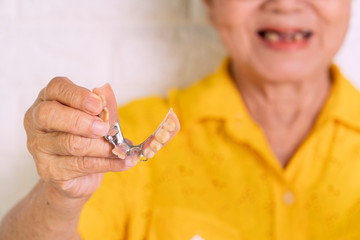 11 Nov 2020
11 Nov 2020 6 things to expect after new dentures
So, you have received your new set of dentures to replace your missing teeth or are planning to have one. If this is your first full denture, there are few things you should keep in mind when you will start using the new denture.
There are two ways you could have dentures made.
- One is immediate denture, which is inserted straight after teeth extraction.
- The other is when you have denture after your gums have completely healed.
Either way there are things you should know about your dentures.
With an immediate denture, as dentures are inserted straight after extractions, it can cause sore spots and ulcers and can cause postoperative discomfort. Dentures may need adjustment during this period.
Also due to the rapid gum shrinkage that occurs within the first few months after extractions, you will go through periods of a loose-fitting denture. Following the healing period (3-6 months post extraction), a relining will need to be performed to make the denture fit properly.
The following are the main points you need to keep in mind.
1) Initial adjustment period with dentures is important.
You must realise that dentures are a replacement for having no teeth at all but they do not function the same way as natural teeth. It needs to be understood that you will have to go through adjustment phase every time you have new denture especially if you wearing denture for first time.
The following factors can cause difficulty in adjusting to new dentures:
- Fragile gum tissues which cannot bear the pressures placed upon them resulting in excessive tenderness and sore spots.
- Jaw ridges which may not provide adequate support and/or retention.
- Musculature in the tongue, floor of the mouth, cheeks, etc. which may not adapt to and be able to accommodate the artificial appliances.
- Excessive gag reflexes
- Excessive saliva or excessive dryness of mouth
- General psychological and/or physical problems interfering with success
2) Full dentures are made up of acrylic.
One thing is acrylic is plastic and prone to breaking. Due to the types of materials which are necessary in the construction of dentures, breakage may occur even though the materials used were not defective.
It can be due to but not limited to:
- Chewing on foods or objects which are excessively hard.
- Gum tissue shrinkage which causes excessive pressure to be exerted unevenly on the dentures.
- Deep bite
- Cracks which may be unnoticeable and which occurred previously from causes such as those mentioned above or the dentures having been dropped or damaged previously.
- Dropping denture.
- Keep in mind, acrylic likes moisture. While the denture is in the mouth, it is moist but when it is out of the mouth, it should be placed in water and tablets like steradent are used for cleaning.
3) Important to keep dentures clean. Other thing to keep cleaning for dentures, cleaning tables, polyydent , brushing
4) Although there are no teeth in mouth but it is still important to see dentist regularly. It is important to have gums and bones checked regularly to assess for oral cancer.
5) Life span of denture. Average life span of dentures is 5 -7 years.
Loose Dentures: Dentures normally become looser when there are changes in the supporting gum tissues as dentures themselves do not change unless subjected to extreme heat or dryness.
6) Some general tips
- Allergies: to dental materials used for dentures over which we do not have any control.
- Speech and Taste: Removable dentures cover areas of the jaws and palate that are not normally covered which may need adaptation of the tongue and lips for proper speech, which may require some time to get used to.
- Dentures may affect the taste of food, especially if the dentures are not properly cleaned.
- Food Impaction: Food may get under denture as there may be minor space between denture and gum and due to movement of denture.
- Therefore, it is essential to remove the denture for cleaning on a periodic, daily basis.
- Numb lip: May occur from the pressure of the removable denture. This problem requires selective adjustment and in rare cases, a nerve might need surgical repositioning.
- Appearance: Every attempt is made to create a natural appearance for the denture; however, it may not be possible for the denture to support the lips and facial contours perfectly.
So is it time to schedule the next step and finally get those dentures? Give us a call today to book your appointment!
